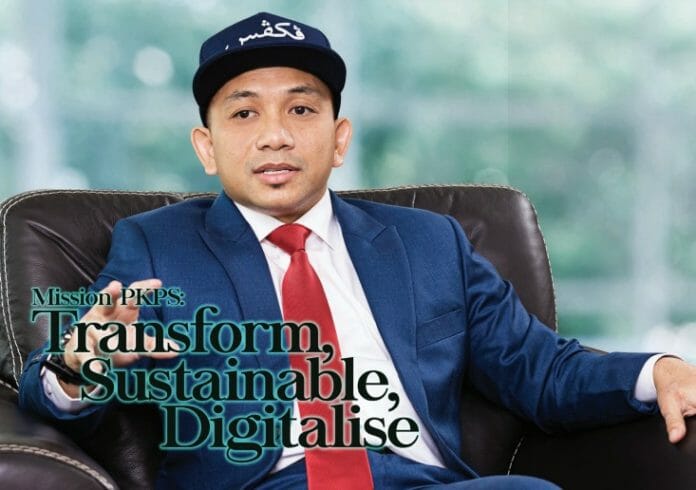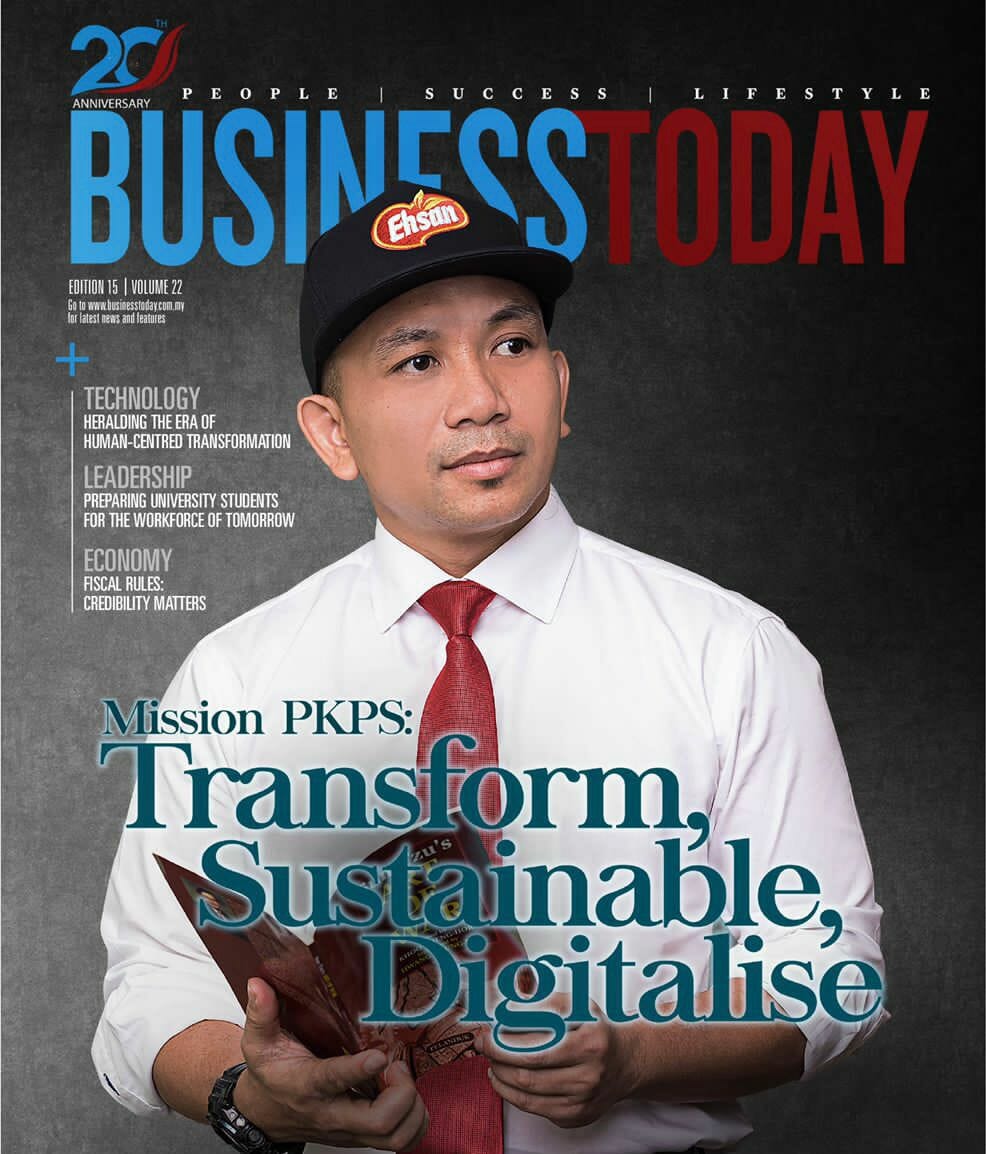Perbadanan Kemajuan Pertanian Selangor (PKPS) appears to have come a long way since its inception in 1972, the State government agency which is responsible for agriculture and plantation development has now become a formidable player in the sector and is aggressively attempting to modernise it.
In terms of functions and roles, PKPS is involved from farm to plate on the food supply chain among others. During the pandemic, Selangor was able to look after its citizens was through the many interventions administered by the agency and the State government. Working behind the scene, it also responsible for keeping the industry sustainable and in empowering younger generations, especially entrepreneurs to play an active role in the states food security agenda.
In an exclusive Interview with BusinessToday, its Group Chief Executive Officer, Dr Mohamad Khairil bin Mohamad Razi said that in the next two years, it would want to build the image and brand of PKPS as an agency that drives these agenda’s and be a catalyst for the agriculture and agro-food industry in Selangor.
“I would also like to see PKPS make a significant contribution to the socio-economic development of the people of Selangor, especially to help farmers and those with low incomes, “he said
The main income of PKPS is from its running of the 14 oil palm plantations which covers an area of over 5,000 hectares in Selangor, Kelantan, and Sabah. Additionally it also manages the Selangor Fruits Valley, Poultry farm (able to produce over 500,000 chickens per cycle) and the Selangor Wholesale Market.
On the agency’s strategy from here onwards, the CEO added that being the largest agricultural agency in Selangor, PKPS is undoubtedly the main agency responsible in implementing solutions and future proof system that can address food security issues. He further went on to add how Selangor is completely self-dependent on the matter, even during the recent lockdown Selangorians were well supported with matters on food. He added that the State will be able to have basic and essential food for at least 3-6 months.
This was tested again during the flood disaster that hit Klang Valley, the state mobilised its team along with PKPS in safeguarding the agricultural ecosystem. For the players like farmers and breeders, efforts were quickly put in place to ensure their livelihood is not impacted and that they can immediately get back on their feet once the situation is resolved.
PKPS Of the Future
Dr. Khairil is not the regular corporate bigwig with fancy suits and flashy shoes, donning his signature baseball cap, his background is actually in palm oil plantation having started his journey with FELDA. After graduating, he furthered his studied in Application of Remote Sensing where he has a PHD.
This knowledge in using GPS and laser mapping of trees and crops in large scale plantation has given him a firm vision on how to manage the planation land and getting maximum yield.
Immersing himself on the job and task ahead, Dr. Khairil formalised a vision that will reposition PKPS from its current position to one that is progressive and yet socially connected with the community.
The formulation of 2022-2025 Strategic Plan is the result of his assessment of the use of land in Selangor and the study of the whole ecosystem, from seeding to harvesting and finally to marketing. This is where he introduced the 3 pillars of transformation for PKPS.
Firstly, being the rebranding of PKPS, celebrating its golden jubilee, the agency needed a serious makeover both aesthetically and purposefully. “Although we have been around for 50 years, we need to appeal to the newer generation and be more adaptive to current demands, the rebranding exercise will see new logo design and a new mission statement,” said Dr. Khairil.
As for the second pillar, it was imperative for PKPS to maximise its land assets, this would mean the utilisation of land will ensure for owners to get maximum yield supported by the agency. One of the methods is by educating on the use of fertilizer, understanding irrigation and using modern technology to monitor crops.
Dr. Khairil is adamant, that he does not want to see land left idle or poorly managed, “we will go in and assist farmers or plantation owners in getting more from their land, we will walkthrough with them until they see the results and believe in our philosophy” exactly the kind of person he is…persistent and hands-on!
The third pillar was about modernising the agricultural sector which has been the buzzword globally for the past couple of years. Bringing his well-researched topic such as remote sensing, Internet of Things (IOT) and LIDAR, the transformation journey for the sector will most interesting. A new era is coming that will even take the mundane palm oil plantation sector into a robust, sexy industry.
When we say palm oil cultivation, many would react by saying that it was an industry that is very conventional and ancient, let’s face it agriculture is not something that is exciting, but with technology and digitalisation everything becomes supercharged! Drones for seeding and monitoring, IoT for irrigation and crop health check, aerial surveillance for land utlisation, the list goes on.
Diving deeper into digitalisation, PKPS is also developing an operations center system named iTech-PKPS to regulate the entire database management process and company information management using the Blockchain Network approach.
Also underway is the development of a trading platform that will serve as a liaison between manufacturers and retailers/wholesalers. This trading platform will facilitate the process of purchasing agricultural products as well as reduce the involvement of middlemen who are a factor in increasing the price of goods. This platform will be known as Smart Agrosys.
All this is designed in the framework of Internet of Things (iOT), Artificial Intelligence and Real Time Analytics.
In addition, PKPS looks at cultivating the concept of Urban Farming, Smart Farming and Precision Agriculture so that the agricultural industry becomes more modern and can attract young people. #MakeAgricultureSexyAgain.
However, all these technology and innovation will have to be carefully balanced with ensuring practises are put in place with sustainable values and environment consideration. PKPS places the aspect of sustainability practices as the highest priority.
To this effect PKPS is already a member of MSPO (Malaysian Sustainable Palm Oil), MPOA (Malaysian Palm Oil Association) and MOPNA (Malaysian Oil Palm Nurseries Association). It is also formulating a policy to support the NDPE Policy (No Deforestation, Peat, Exploitation) and assures that all the requirements of this policy will be complied with transparently and thoroughly.
In addition, PKPS is working with other government agencies and non-governmental organizations (NGOs) to help the state government ensure sustainability practices in plantations can be maintained.
To read the full story, check out BusinessToday’s February 2022 issue.










